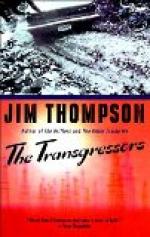With their hands above their head, some of the men walk deliberately toward the deputies. Indians will recognize this as the sign of surrender, and will give quarter. But the deputies, with unerring aim, shoot down the voluntary captive.
It would not be so terrible if the miners were returning the fire, if they were offering any resistance. But they are absolutely unarmed. Their mission has been to present a petition to the miners of Harleigh. The slaves of the South had enjoyed the right of petition. How could these twentieth century miners anticipate that the sheriff would massacre them on the highway for seeking to present a petition?
“Have you shot any one?” asks one of the deputies of his nearest companion.
“Shot any one! Well, I should think I had. I’ve seen four drop. Here goes a fifth.”
To stand, to run, to fall to the ground, all are equally futile as means of escape. Extermination is all that will stay the fire of the police.
Sheriff Marlin and Captain Grout stand in the middle of the road. Metz, O’Connor, and Nevins, a mine foreman, are standing beside them.
O’Connor carries the white flag; Nevins the National emblem.
“Disarm those men,” Marlin directs the Captain.
“Disarm them?” Captain Grout repeats, inquiringly.
“Certainly. They have sticks in their hands.”
Two deputies, who have exhausted their supply of cartridges in their magazine rifles, stop reloading and rush upon Nevins. They beat him over the head with their rifle butts. The flag is snatched out of his hands.
O’Connor is dealt a blow an instant later.
The subjugation of the unarmed miners is accomplished.
One by one the Coal and Iron Police return.
Some of them bring in captives who have escaped death, but who still have felt the sting of the bullets.
Of the sixty miners, twenty-three are killed outright; ten are mortally wounded; twenty-one have less serious wounds.
Six have run the gauntlet and are fleeing back to Hazleton.
The triumphant march of the police to Hazleton is begun.
“We will carry the wounded,” says the sheriff. “They might get through to Harleigh and Latimer.”
“We will round up the six who escaped,” Captain Grout assures the sheriff. He then details ten men to run down the miners who have eluded capture.
This is an easy matter, as the footprints of the miners are perfectly distinct in the soft snow. On the six trails the men set off, as a pack of hounds on the scent of game.
This man-hunt results in an addition of six to the list of the slain.
Gorman Purdy’s orders have been carried out.
His police have been sworn in as deputies; they have met the miners and have “fired first.”
The sanctity of the law enveloped their act. They shot as Deputies.




